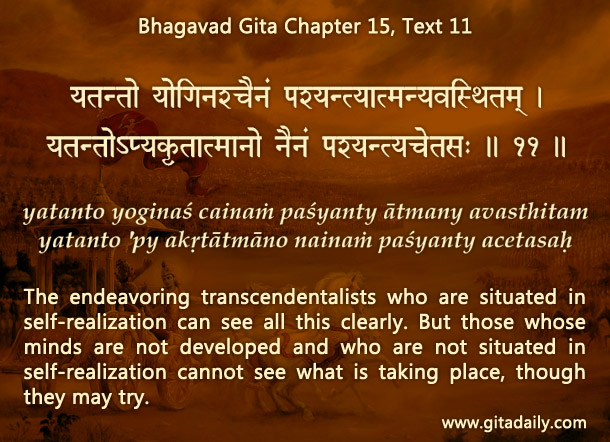Suppose an aggressor attacks a person and brutally destroys their eyes. We would consider that aggressor atrocious.
Shockingly, we all are attacked by a terrible aggressor: attachment. This aggressor is so sneaky that it doesn’t destroy our eyes; it just diminishes our vision by making our eyes riveted to the object of attachment. Thus, for example, alcoholics often fixate so much on alcohol that they are functionally blinded to all that they are risking for alcohol: their money, their health, their reputation, their relationships, their character, even their life.
While we may not have any specific destructive attachment like alcohol, we all have a generic attachment to material pleasures that fixates our consciousness on material things. The Bhagavad-gita (15.11) states that even if we endeavor to see spiritual truth, we can’t, as long as we are materially attached. The worst part of being blinded by attachment is that we don’t even realize that our vision has been diminished and that we are missing something. If we happen to associate with saintly spiritualists who relish spiritual joys, only then we notice that we are missing something sublime. Thereafter, we start exploring if and how our blindness can be cured.
While some kinds of physical blindness may be incurable, the blindness caused by attachment is curable. How? By insight and taste. If we regularly study the Bhagavad-gita, its wisdom can give us the insight to fight against attachment. And if we connect with the all-attractive supreme, Krishna, that devotional connection can give us the taste to break free from attachment.
With our vision thus restored, we can perceive reality, material and spiritual, in its fullness and relish life in its richness.
One-sentence summary:
Attachment is a sinister blinder — it blinds not by destroying our eyes but by diminishing our vision.
Think it over:
- How is attachment a sinister blinder?
- How can the blindness of attachment be cured?
- Does any attachment blind you? What can you do to counter that blindness?
***
15.11: The endeavoring transcendentalists who are situated in self-realization can see all this clearly. But those whose minds are not developed and who are not situated in self-realization cannot see what is taking place, though they may try.
To know more about this verse, please click on the image
Explanation of article:

Podcast:


Attachment is the perception of the mind